Trinity Western University: Formal Literature Review of Leadership
VerifiedAdded on 2020/05/04
|14
|3384
|95
Report
AI Summary
This report presents a formal literature review on leadership, focusing on its impact on organizational development and individual growth. It explores the influence of leadership decision-making, different leadership styles (autocratic, participative, and delegative) and their effects, the role of leaders in organizational diversity, and the importance of emotional intelligence in leadership. The review also examines 13 aspects of effective leadership behavior. The study emphasizes the significance of leadership in addressing organizational challenges, fostering employee growth, and achieving organizational goals in a competitive environment. The report references several academic sources to support its findings, providing a comprehensive overview of the subject matter.
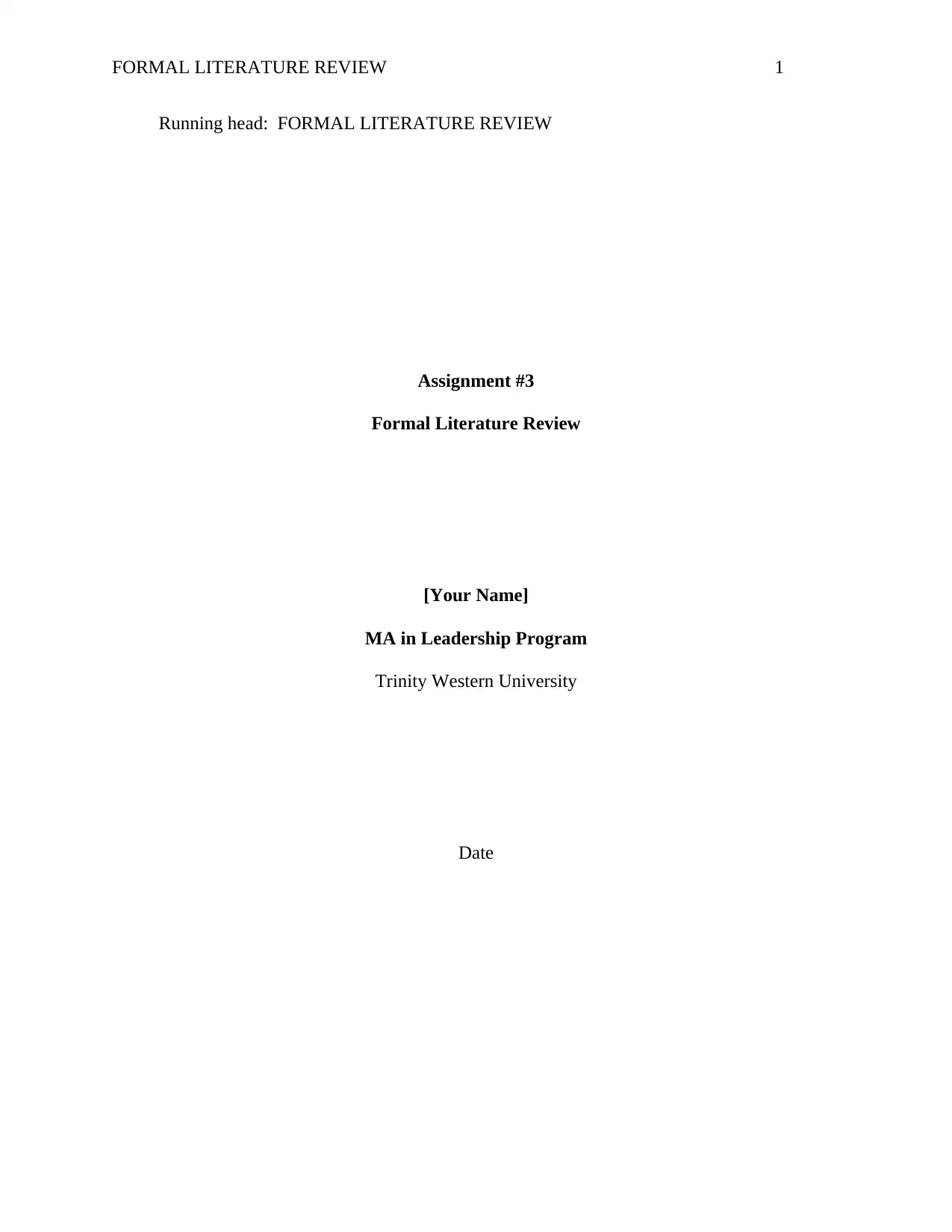
FORMAL LITERATURE REVIEW 1
Running head: FORMAL LITERATURE REVIEW
Assignment #3
Formal Literature Review
[Your Name]
MA in Leadership Program
Trinity Western University
Date
Running head: FORMAL LITERATURE REVIEW
Assignment #3
Formal Literature Review
[Your Name]
MA in Leadership Program
Trinity Western University
Date
Paraphrase This Document
Need a fresh take? Get an instant paraphrase of this document with our AI Paraphraser
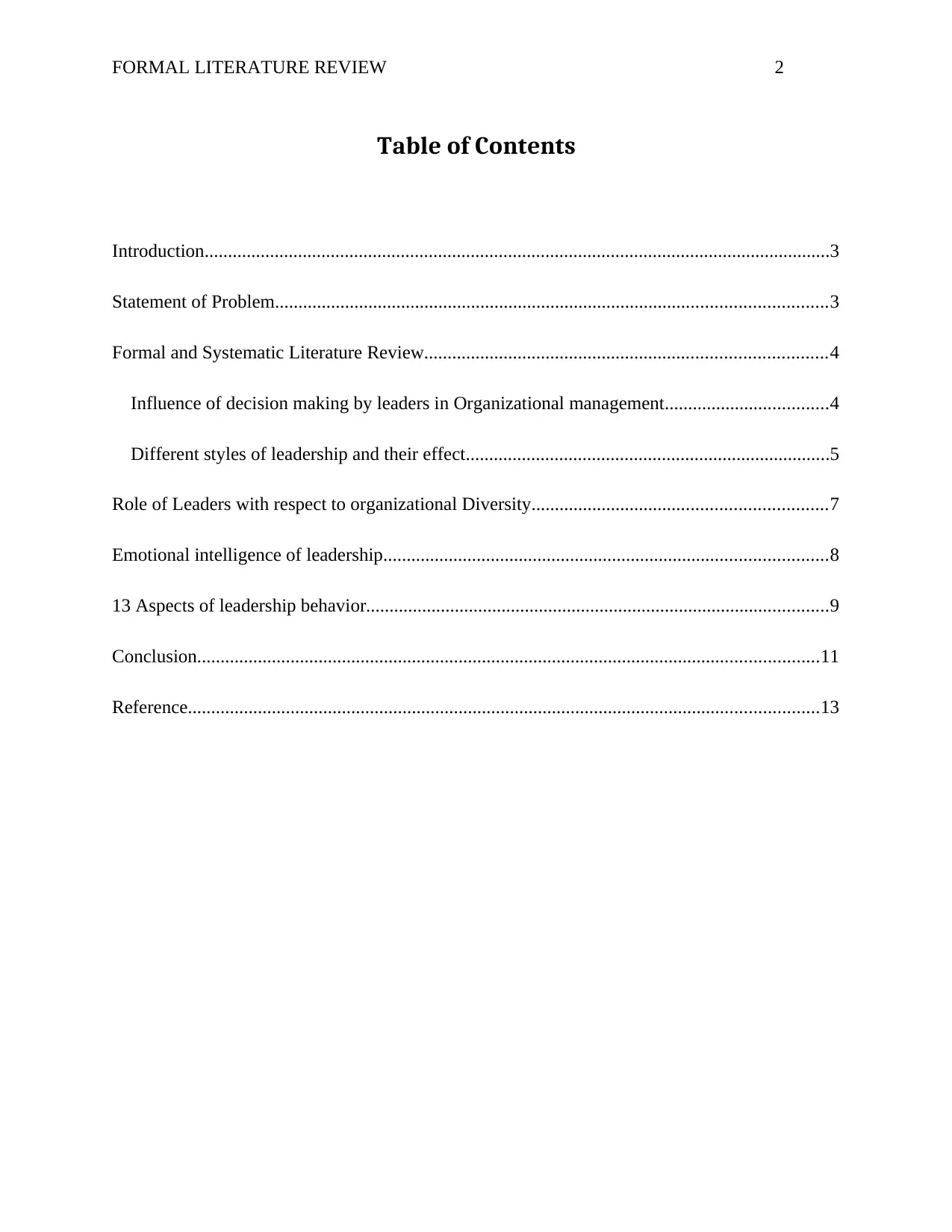
FORMAL LITERATURE REVIEW 2
Table of Contents
Introduction......................................................................................................................................3
Statement of Problem......................................................................................................................3
Formal and Systematic Literature Review......................................................................................4
Influence of decision making by leaders in Organizational management...................................4
Different styles of leadership and their effect..............................................................................5
Role of Leaders with respect to organizational Diversity...............................................................7
Emotional intelligence of leadership...............................................................................................8
13 Aspects of leadership behavior...................................................................................................9
Conclusion.....................................................................................................................................11
Reference.......................................................................................................................................13
Table of Contents
Introduction......................................................................................................................................3
Statement of Problem......................................................................................................................3
Formal and Systematic Literature Review......................................................................................4
Influence of decision making by leaders in Organizational management...................................4
Different styles of leadership and their effect..............................................................................5
Role of Leaders with respect to organizational Diversity...............................................................7
Emotional intelligence of leadership...............................................................................................8
13 Aspects of leadership behavior...................................................................................................9
Conclusion.....................................................................................................................................11
Reference.......................................................................................................................................13
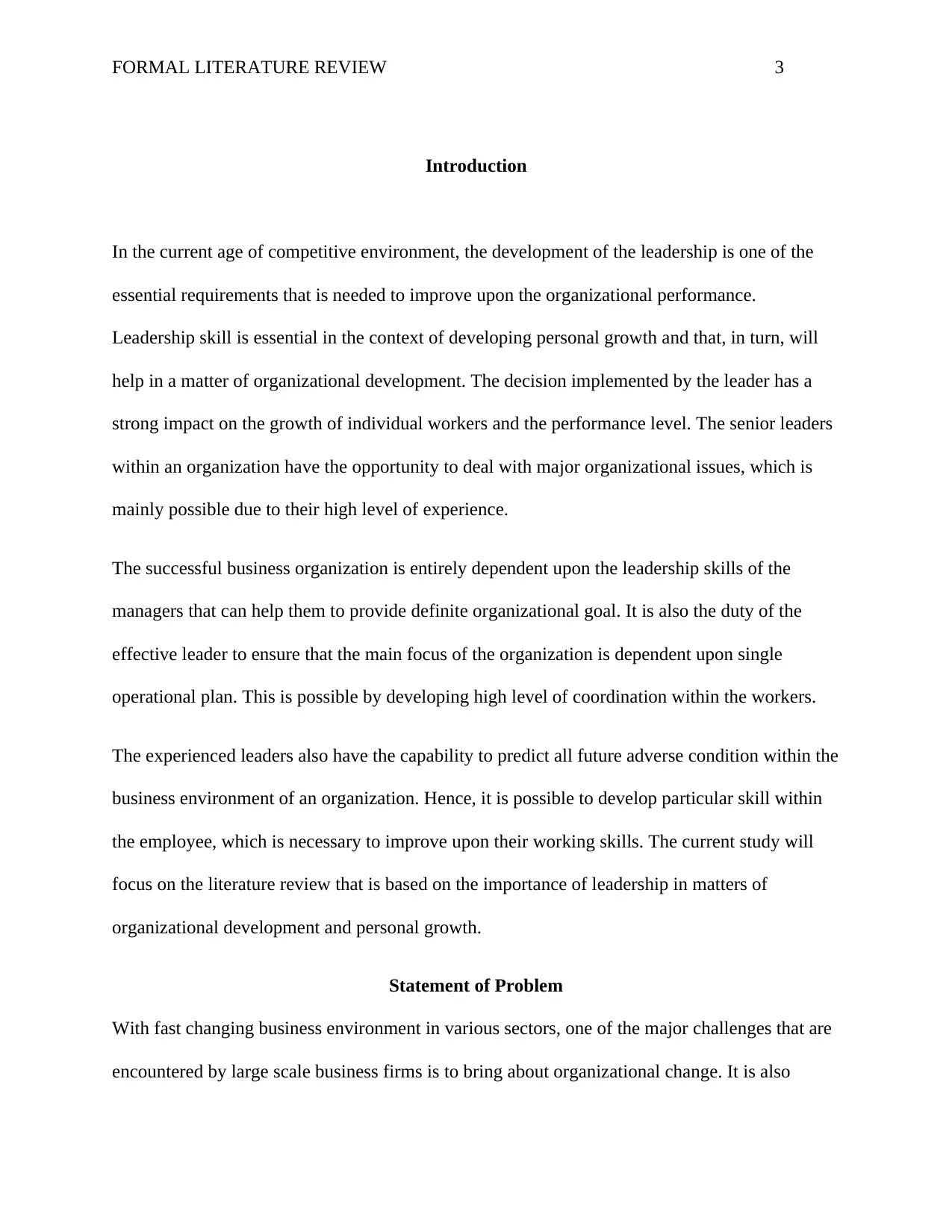
FORMAL LITERATURE REVIEW 3
Introduction
In the current age of competitive environment, the development of the leadership is one of the
essential requirements that is needed to improve upon the organizational performance.
Leadership skill is essential in the context of developing personal growth and that, in turn, will
help in a matter of organizational development. The decision implemented by the leader has a
strong impact on the growth of individual workers and the performance level. The senior leaders
within an organization have the opportunity to deal with major organizational issues, which is
mainly possible due to their high level of experience.
The successful business organization is entirely dependent upon the leadership skills of the
managers that can help them to provide definite organizational goal. It is also the duty of the
effective leader to ensure that the main focus of the organization is dependent upon single
operational plan. This is possible by developing high level of coordination within the workers.
The experienced leaders also have the capability to predict all future adverse condition within the
business environment of an organization. Hence, it is possible to develop particular skill within
the employee, which is necessary to improve upon their working skills. The current study will
focus on the literature review that is based on the importance of leadership in matters of
organizational development and personal growth.
Statement of Problem
With fast changing business environment in various sectors, one of the major challenges that are
encountered by large scale business firms is to bring about organizational change. It is also
Introduction
In the current age of competitive environment, the development of the leadership is one of the
essential requirements that is needed to improve upon the organizational performance.
Leadership skill is essential in the context of developing personal growth and that, in turn, will
help in a matter of organizational development. The decision implemented by the leader has a
strong impact on the growth of individual workers and the performance level. The senior leaders
within an organization have the opportunity to deal with major organizational issues, which is
mainly possible due to their high level of experience.
The successful business organization is entirely dependent upon the leadership skills of the
managers that can help them to provide definite organizational goal. It is also the duty of the
effective leader to ensure that the main focus of the organization is dependent upon single
operational plan. This is possible by developing high level of coordination within the workers.
The experienced leaders also have the capability to predict all future adverse condition within the
business environment of an organization. Hence, it is possible to develop particular skill within
the employee, which is necessary to improve upon their working skills. The current study will
focus on the literature review that is based on the importance of leadership in matters of
organizational development and personal growth.
Statement of Problem
With fast changing business environment in various sectors, one of the major challenges that are
encountered by large scale business firms is to bring about organizational change. It is also
⊘ This is a preview!⊘
Do you want full access?
Subscribe today to unlock all pages.

Trusted by 1+ million students worldwide
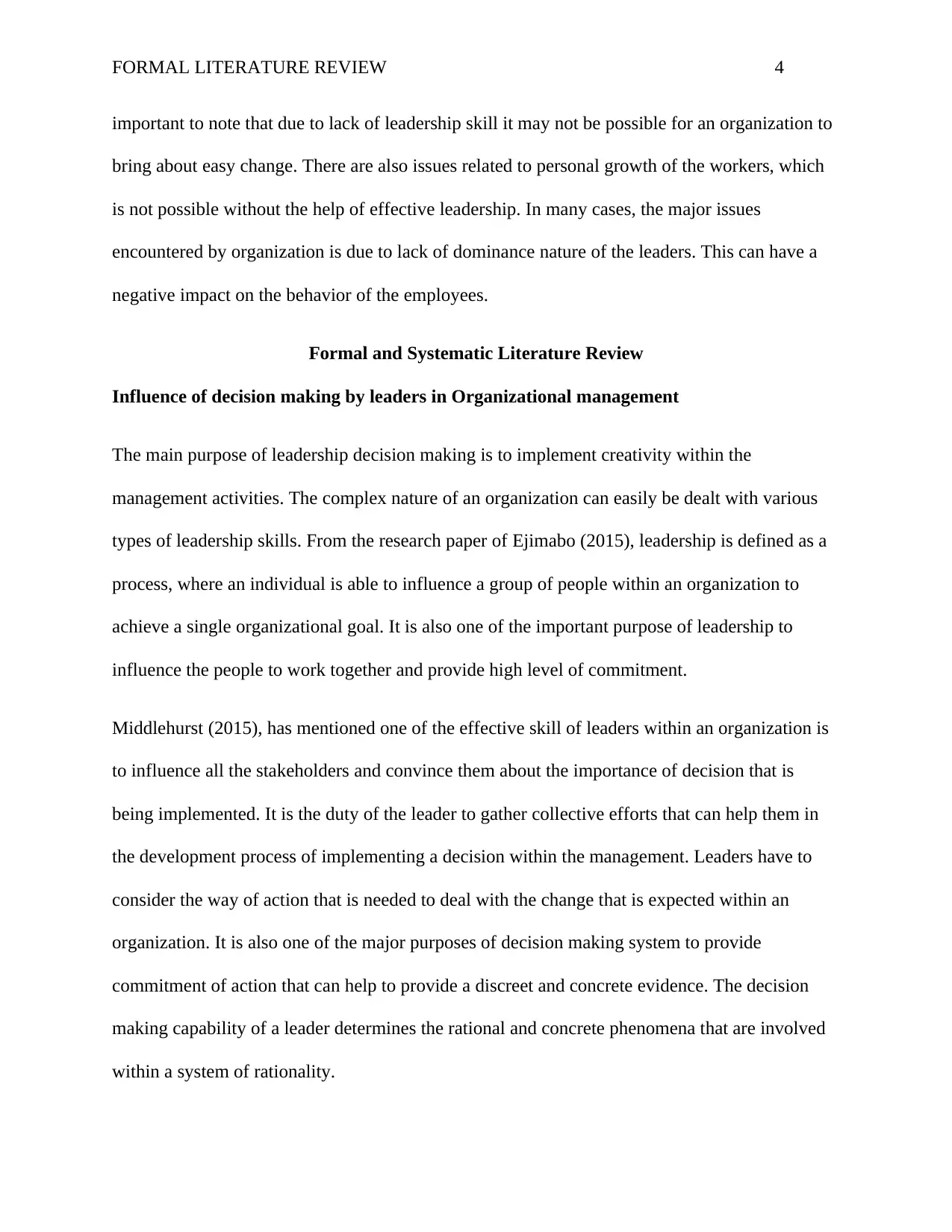
FORMAL LITERATURE REVIEW 4
important to note that due to lack of leadership skill it may not be possible for an organization to
bring about easy change. There are also issues related to personal growth of the workers, which
is not possible without the help of effective leadership. In many cases, the major issues
encountered by organization is due to lack of dominance nature of the leaders. This can have a
negative impact on the behavior of the employees.
Formal and Systematic Literature Review
Influence of decision making by leaders in Organizational management
The main purpose of leadership decision making is to implement creativity within the
management activities. The complex nature of an organization can easily be dealt with various
types of leadership skills. From the research paper of Ejimabo (2015), leadership is defined as a
process, where an individual is able to influence a group of people within an organization to
achieve a single organizational goal. It is also one of the important purpose of leadership to
influence the people to work together and provide high level of commitment.
Middlehurst (2015), has mentioned one of the effective skill of leaders within an organization is
to influence all the stakeholders and convince them about the importance of decision that is
being implemented. It is the duty of the leader to gather collective efforts that can help them in
the development process of implementing a decision within the management. Leaders have to
consider the way of action that is needed to deal with the change that is expected within an
organization. It is also one of the major purposes of decision making system to provide
commitment of action that can help to provide a discreet and concrete evidence. The decision
making capability of a leader determines the rational and concrete phenomena that are involved
within a system of rationality.
important to note that due to lack of leadership skill it may not be possible for an organization to
bring about easy change. There are also issues related to personal growth of the workers, which
is not possible without the help of effective leadership. In many cases, the major issues
encountered by organization is due to lack of dominance nature of the leaders. This can have a
negative impact on the behavior of the employees.
Formal and Systematic Literature Review
Influence of decision making by leaders in Organizational management
The main purpose of leadership decision making is to implement creativity within the
management activities. The complex nature of an organization can easily be dealt with various
types of leadership skills. From the research paper of Ejimabo (2015), leadership is defined as a
process, where an individual is able to influence a group of people within an organization to
achieve a single organizational goal. It is also one of the important purpose of leadership to
influence the people to work together and provide high level of commitment.
Middlehurst (2015), has mentioned one of the effective skill of leaders within an organization is
to influence all the stakeholders and convince them about the importance of decision that is
being implemented. It is the duty of the leader to gather collective efforts that can help them in
the development process of implementing a decision within the management. Leaders have to
consider the way of action that is needed to deal with the change that is expected within an
organization. It is also one of the major purposes of decision making system to provide
commitment of action that can help to provide a discreet and concrete evidence. The decision
making capability of a leader determines the rational and concrete phenomena that are involved
within a system of rationality.
Paraphrase This Document
Need a fresh take? Get an instant paraphrase of this document with our AI Paraphraser
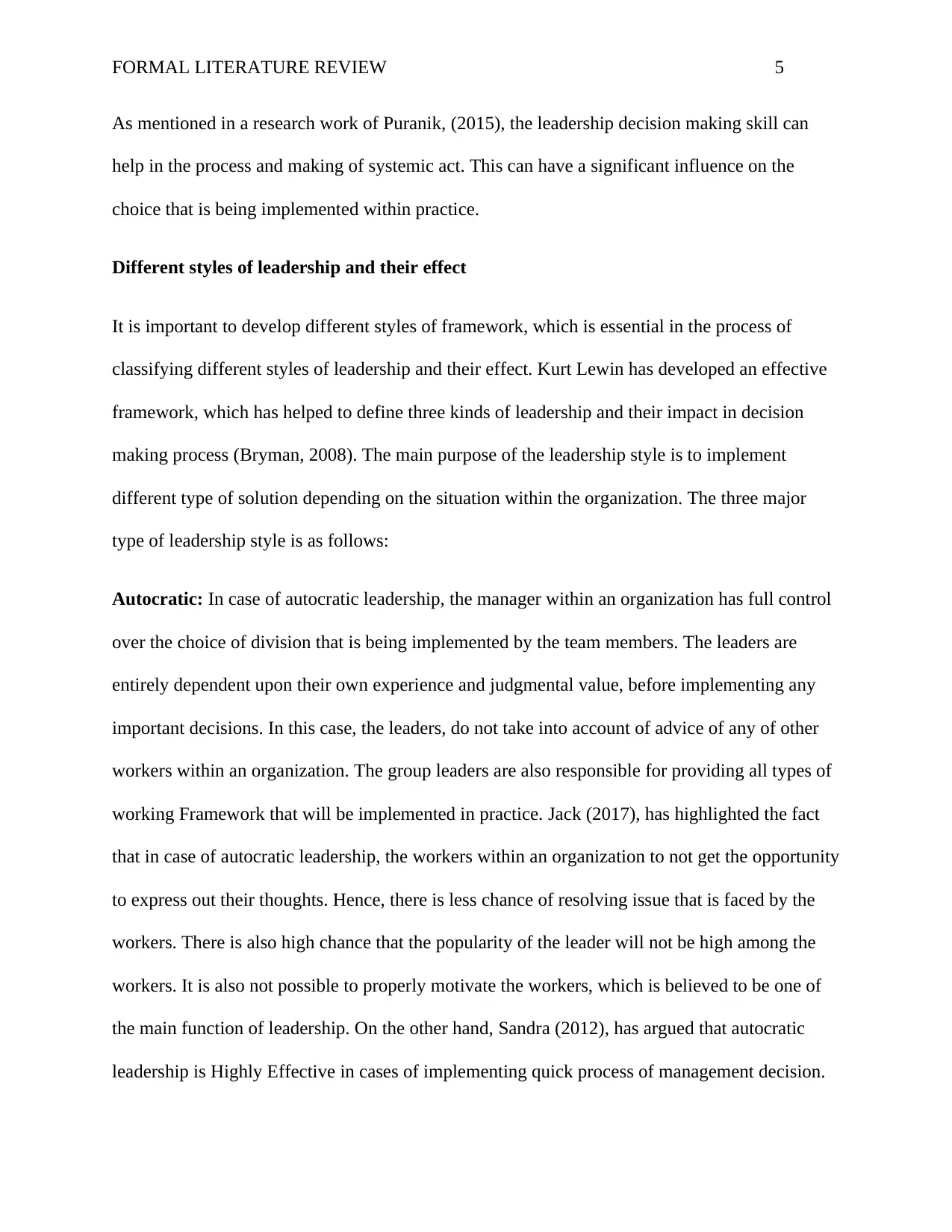
FORMAL LITERATURE REVIEW 5
As mentioned in a research work of Puranik, (2015), the leadership decision making skill can
help in the process and making of systemic act. This can have a significant influence on the
choice that is being implemented within practice.
Different styles of leadership and their effect
It is important to develop different styles of framework, which is essential in the process of
classifying different styles of leadership and their effect. Kurt Lewin has developed an effective
framework, which has helped to define three kinds of leadership and their impact in decision
making process (Bryman, 2008). The main purpose of the leadership style is to implement
different type of solution depending on the situation within the organization. The three major
type of leadership style is as follows:
Autocratic: In case of autocratic leadership, the manager within an organization has full control
over the choice of division that is being implemented by the team members. The leaders are
entirely dependent upon their own experience and judgmental value, before implementing any
important decisions. In this case, the leaders, do not take into account of advice of any of other
workers within an organization. The group leaders are also responsible for providing all types of
working Framework that will be implemented in practice. Jack (2017), has highlighted the fact
that in case of autocratic leadership, the workers within an organization to not get the opportunity
to express out their thoughts. Hence, there is less chance of resolving issue that is faced by the
workers. There is also high chance that the popularity of the leader will not be high among the
workers. It is also not possible to properly motivate the workers, which is believed to be one of
the main function of leadership. On the other hand, Sandra (2012), has argued that autocratic
leadership is Highly Effective in cases of implementing quick process of management decision.
As mentioned in a research work of Puranik, (2015), the leadership decision making skill can
help in the process and making of systemic act. This can have a significant influence on the
choice that is being implemented within practice.
Different styles of leadership and their effect
It is important to develop different styles of framework, which is essential in the process of
classifying different styles of leadership and their effect. Kurt Lewin has developed an effective
framework, which has helped to define three kinds of leadership and their impact in decision
making process (Bryman, 2008). The main purpose of the leadership style is to implement
different type of solution depending on the situation within the organization. The three major
type of leadership style is as follows:
Autocratic: In case of autocratic leadership, the manager within an organization has full control
over the choice of division that is being implemented by the team members. The leaders are
entirely dependent upon their own experience and judgmental value, before implementing any
important decisions. In this case, the leaders, do not take into account of advice of any of other
workers within an organization. The group leaders are also responsible for providing all types of
working Framework that will be implemented in practice. Jack (2017), has highlighted the fact
that in case of autocratic leadership, the workers within an organization to not get the opportunity
to express out their thoughts. Hence, there is less chance of resolving issue that is faced by the
workers. There is also high chance that the popularity of the leader will not be high among the
workers. It is also not possible to properly motivate the workers, which is believed to be one of
the main function of leadership. On the other hand, Sandra (2012), has argued that autocratic
leadership is Highly Effective in cases of implementing quick process of management decision.
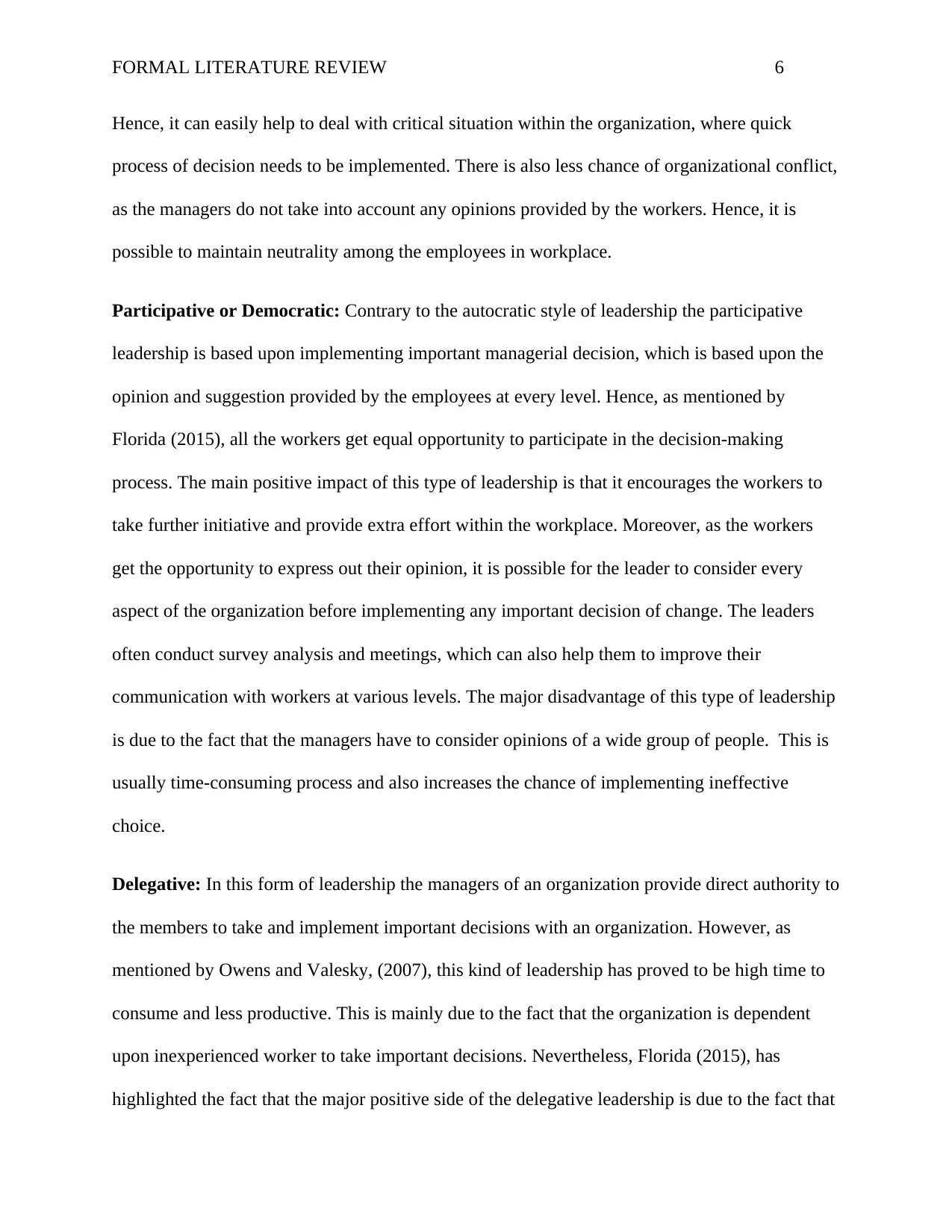
FORMAL LITERATURE REVIEW 6
Hence, it can easily help to deal with critical situation within the organization, where quick
process of decision needs to be implemented. There is also less chance of organizational conflict,
as the managers do not take into account any opinions provided by the workers. Hence, it is
possible to maintain neutrality among the employees in workplace.
Participative or Democratic: Contrary to the autocratic style of leadership the participative
leadership is based upon implementing important managerial decision, which is based upon the
opinion and suggestion provided by the employees at every level. Hence, as mentioned by
Florida (2015), all the workers get equal opportunity to participate in the decision-making
process. The main positive impact of this type of leadership is that it encourages the workers to
take further initiative and provide extra effort within the workplace. Moreover, as the workers
get the opportunity to express out their opinion, it is possible for the leader to consider every
aspect of the organization before implementing any important decision of change. The leaders
often conduct survey analysis and meetings, which can also help them to improve their
communication with workers at various levels. The major disadvantage of this type of leadership
is due to the fact that the managers have to consider opinions of a wide group of people. This is
usually time-consuming process and also increases the chance of implementing ineffective
choice.
Delegative: In this form of leadership the managers of an organization provide direct authority to
the members to take and implement important decisions with an organization. However, as
mentioned by Owens and Valesky, (2007), this kind of leadership has proved to be high time to
consume and less productive. This is mainly due to the fact that the organization is dependent
upon inexperienced worker to take important decisions. Nevertheless, Florida (2015), has
highlighted the fact that the major positive side of the delegative leadership is due to the fact that
Hence, it can easily help to deal with critical situation within the organization, where quick
process of decision needs to be implemented. There is also less chance of organizational conflict,
as the managers do not take into account any opinions provided by the workers. Hence, it is
possible to maintain neutrality among the employees in workplace.
Participative or Democratic: Contrary to the autocratic style of leadership the participative
leadership is based upon implementing important managerial decision, which is based upon the
opinion and suggestion provided by the employees at every level. Hence, as mentioned by
Florida (2015), all the workers get equal opportunity to participate in the decision-making
process. The main positive impact of this type of leadership is that it encourages the workers to
take further initiative and provide extra effort within the workplace. Moreover, as the workers
get the opportunity to express out their opinion, it is possible for the leader to consider every
aspect of the organization before implementing any important decision of change. The leaders
often conduct survey analysis and meetings, which can also help them to improve their
communication with workers at various levels. The major disadvantage of this type of leadership
is due to the fact that the managers have to consider opinions of a wide group of people. This is
usually time-consuming process and also increases the chance of implementing ineffective
choice.
Delegative: In this form of leadership the managers of an organization provide direct authority to
the members to take and implement important decisions with an organization. However, as
mentioned by Owens and Valesky, (2007), this kind of leadership has proved to be high time to
consume and less productive. This is mainly due to the fact that the organization is dependent
upon inexperienced worker to take important decisions. Nevertheless, Florida (2015), has
highlighted the fact that the major positive side of the delegative leadership is due to the fact that
⊘ This is a preview!⊘
Do you want full access?
Subscribe today to unlock all pages.

Trusted by 1+ million students worldwide
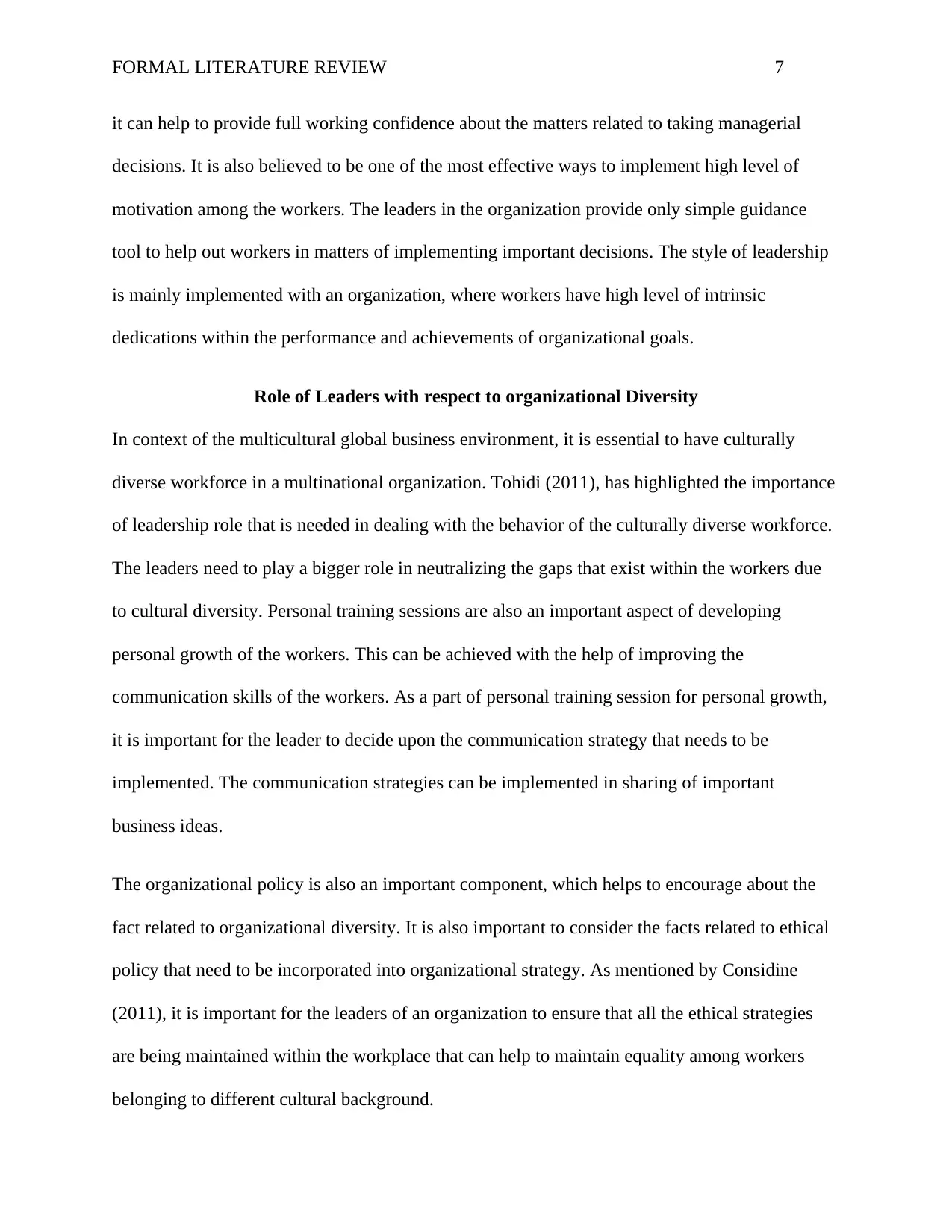
FORMAL LITERATURE REVIEW 7
it can help to provide full working confidence about the matters related to taking managerial
decisions. It is also believed to be one of the most effective ways to implement high level of
motivation among the workers. The leaders in the organization provide only simple guidance
tool to help out workers in matters of implementing important decisions. The style of leadership
is mainly implemented with an organization, where workers have high level of intrinsic
dedications within the performance and achievements of organizational goals.
Role of Leaders with respect to organizational Diversity
In context of the multicultural global business environment, it is essential to have culturally
diverse workforce in a multinational organization. Tohidi (2011), has highlighted the importance
of leadership role that is needed in dealing with the behavior of the culturally diverse workforce.
The leaders need to play a bigger role in neutralizing the gaps that exist within the workers due
to cultural diversity. Personal training sessions are also an important aspect of developing
personal growth of the workers. This can be achieved with the help of improving the
communication skills of the workers. As a part of personal training session for personal growth,
it is important for the leader to decide upon the communication strategy that needs to be
implemented. The communication strategies can be implemented in sharing of important
business ideas.
The organizational policy is also an important component, which helps to encourage about the
fact related to organizational diversity. It is also important to consider the facts related to ethical
policy that need to be incorporated into organizational strategy. As mentioned by Considine
(2011), it is important for the leaders of an organization to ensure that all the ethical strategies
are being maintained within the workplace that can help to maintain equality among workers
belonging to different cultural background.
it can help to provide full working confidence about the matters related to taking managerial
decisions. It is also believed to be one of the most effective ways to implement high level of
motivation among the workers. The leaders in the organization provide only simple guidance
tool to help out workers in matters of implementing important decisions. The style of leadership
is mainly implemented with an organization, where workers have high level of intrinsic
dedications within the performance and achievements of organizational goals.
Role of Leaders with respect to organizational Diversity
In context of the multicultural global business environment, it is essential to have culturally
diverse workforce in a multinational organization. Tohidi (2011), has highlighted the importance
of leadership role that is needed in dealing with the behavior of the culturally diverse workforce.
The leaders need to play a bigger role in neutralizing the gaps that exist within the workers due
to cultural diversity. Personal training sessions are also an important aspect of developing
personal growth of the workers. This can be achieved with the help of improving the
communication skills of the workers. As a part of personal training session for personal growth,
it is important for the leader to decide upon the communication strategy that needs to be
implemented. The communication strategies can be implemented in sharing of important
business ideas.
The organizational policy is also an important component, which helps to encourage about the
fact related to organizational diversity. It is also important to consider the facts related to ethical
policy that need to be incorporated into organizational strategy. As mentioned by Considine
(2011), it is important for the leaders of an organization to ensure that all the ethical strategies
are being maintained within the workplace that can help to maintain equality among workers
belonging to different cultural background.
Paraphrase This Document
Need a fresh take? Get an instant paraphrase of this document with our AI Paraphraser
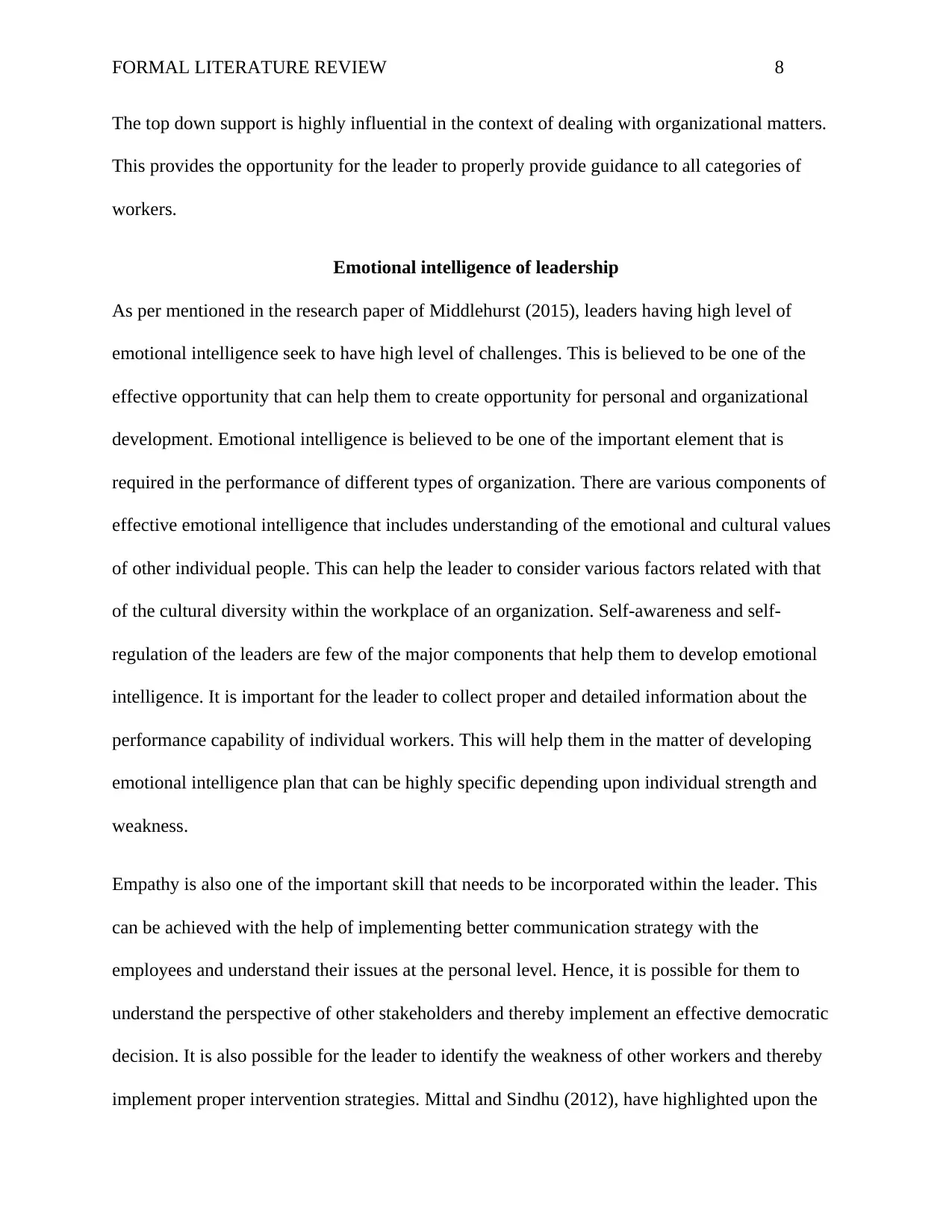
FORMAL LITERATURE REVIEW 8
The top down support is highly influential in the context of dealing with organizational matters.
This provides the opportunity for the leader to properly provide guidance to all categories of
workers.
Emotional intelligence of leadership
As per mentioned in the research paper of Middlehurst (2015), leaders having high level of
emotional intelligence seek to have high level of challenges. This is believed to be one of the
effective opportunity that can help them to create opportunity for personal and organizational
development. Emotional intelligence is believed to be one of the important element that is
required in the performance of different types of organization. There are various components of
effective emotional intelligence that includes understanding of the emotional and cultural values
of other individual people. This can help the leader to consider various factors related with that
of the cultural diversity within the workplace of an organization. Self-awareness and self-
regulation of the leaders are few of the major components that help them to develop emotional
intelligence. It is important for the leader to collect proper and detailed information about the
performance capability of individual workers. This will help them in the matter of developing
emotional intelligence plan that can be highly specific depending upon individual strength and
weakness.
Empathy is also one of the important skill that needs to be incorporated within the leader. This
can be achieved with the help of implementing better communication strategy with the
employees and understand their issues at the personal level. Hence, it is possible for them to
understand the perspective of other stakeholders and thereby implement an effective democratic
decision. It is also possible for the leader to identify the weakness of other workers and thereby
implement proper intervention strategies. Mittal and Sindhu (2012), have highlighted upon the
The top down support is highly influential in the context of dealing with organizational matters.
This provides the opportunity for the leader to properly provide guidance to all categories of
workers.
Emotional intelligence of leadership
As per mentioned in the research paper of Middlehurst (2015), leaders having high level of
emotional intelligence seek to have high level of challenges. This is believed to be one of the
effective opportunity that can help them to create opportunity for personal and organizational
development. Emotional intelligence is believed to be one of the important element that is
required in the performance of different types of organization. There are various components of
effective emotional intelligence that includes understanding of the emotional and cultural values
of other individual people. This can help the leader to consider various factors related with that
of the cultural diversity within the workplace of an organization. Self-awareness and self-
regulation of the leaders are few of the major components that help them to develop emotional
intelligence. It is important for the leader to collect proper and detailed information about the
performance capability of individual workers. This will help them in the matter of developing
emotional intelligence plan that can be highly specific depending upon individual strength and
weakness.
Empathy is also one of the important skill that needs to be incorporated within the leader. This
can be achieved with the help of implementing better communication strategy with the
employees and understand their issues at the personal level. Hence, it is possible for them to
understand the perspective of other stakeholders and thereby implement an effective democratic
decision. It is also possible for the leader to identify the weakness of other workers and thereby
implement proper intervention strategies. Mittal and Sindhu (2012), have highlighted upon the
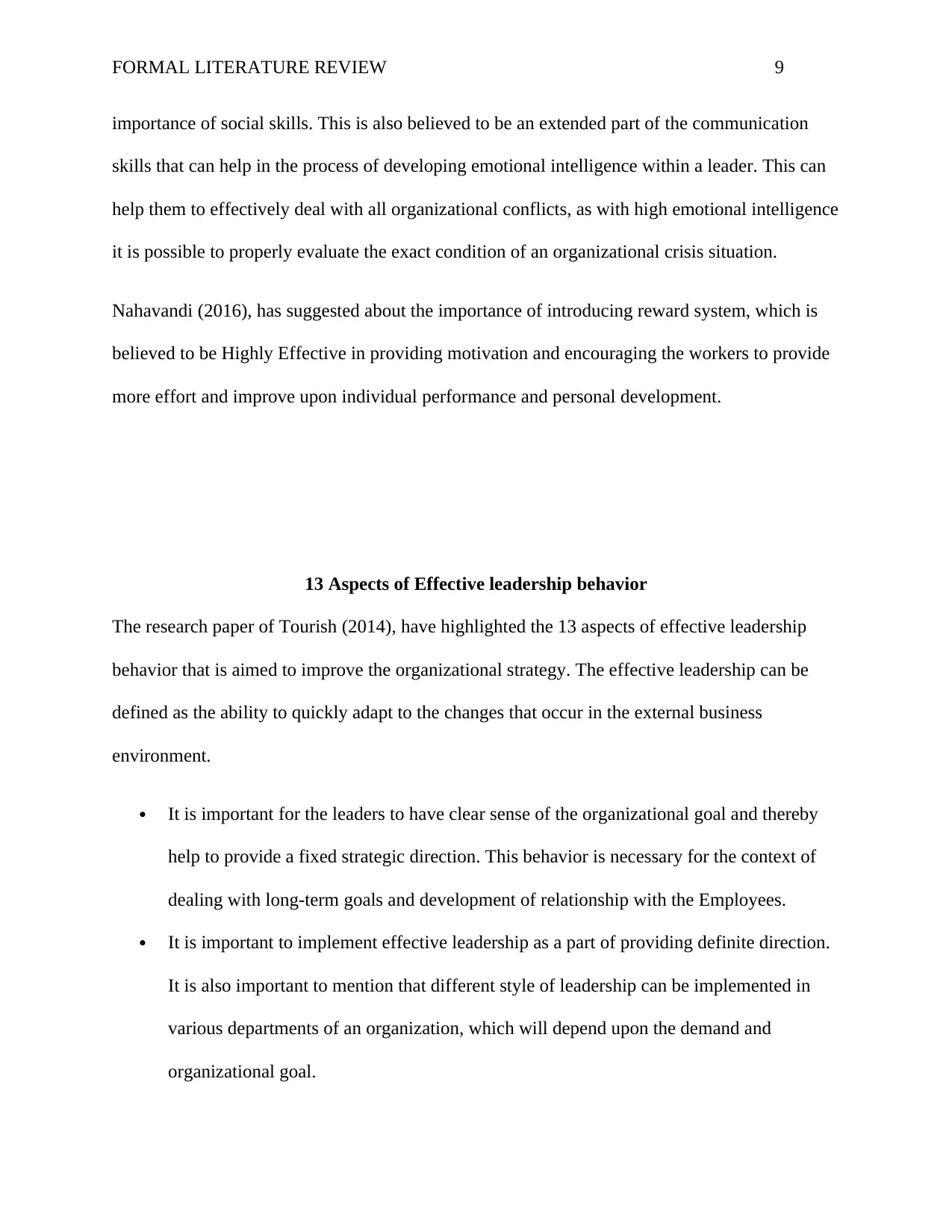
FORMAL LITERATURE REVIEW 9
importance of social skills. This is also believed to be an extended part of the communication
skills that can help in the process of developing emotional intelligence within a leader. This can
help them to effectively deal with all organizational conflicts, as with high emotional intelligence
it is possible to properly evaluate the exact condition of an organizational crisis situation.
Nahavandi (2016), has suggested about the importance of introducing reward system, which is
believed to be Highly Effective in providing motivation and encouraging the workers to provide
more effort and improve upon individual performance and personal development.
13 Aspects of Effective leadership behavior
The research paper of Tourish (2014), have highlighted the 13 aspects of effective leadership
behavior that is aimed to improve the organizational strategy. The effective leadership can be
defined as the ability to quickly adapt to the changes that occur in the external business
environment.
It is important for the leaders to have clear sense of the organizational goal and thereby
help to provide a fixed strategic direction. This behavior is necessary for the context of
dealing with long-term goals and development of relationship with the Employees.
It is important to implement effective leadership as a part of providing definite direction.
It is also important to mention that different style of leadership can be implemented in
various departments of an organization, which will depend upon the demand and
organizational goal.
importance of social skills. This is also believed to be an extended part of the communication
skills that can help in the process of developing emotional intelligence within a leader. This can
help them to effectively deal with all organizational conflicts, as with high emotional intelligence
it is possible to properly evaluate the exact condition of an organizational crisis situation.
Nahavandi (2016), has suggested about the importance of introducing reward system, which is
believed to be Highly Effective in providing motivation and encouraging the workers to provide
more effort and improve upon individual performance and personal development.
13 Aspects of Effective leadership behavior
The research paper of Tourish (2014), have highlighted the 13 aspects of effective leadership
behavior that is aimed to improve the organizational strategy. The effective leadership can be
defined as the ability to quickly adapt to the changes that occur in the external business
environment.
It is important for the leaders to have clear sense of the organizational goal and thereby
help to provide a fixed strategic direction. This behavior is necessary for the context of
dealing with long-term goals and development of relationship with the Employees.
It is important to implement effective leadership as a part of providing definite direction.
It is also important to mention that different style of leadership can be implemented in
various departments of an organization, which will depend upon the demand and
organizational goal.
⊘ This is a preview!⊘
Do you want full access?
Subscribe today to unlock all pages.

Trusted by 1+ million students worldwide
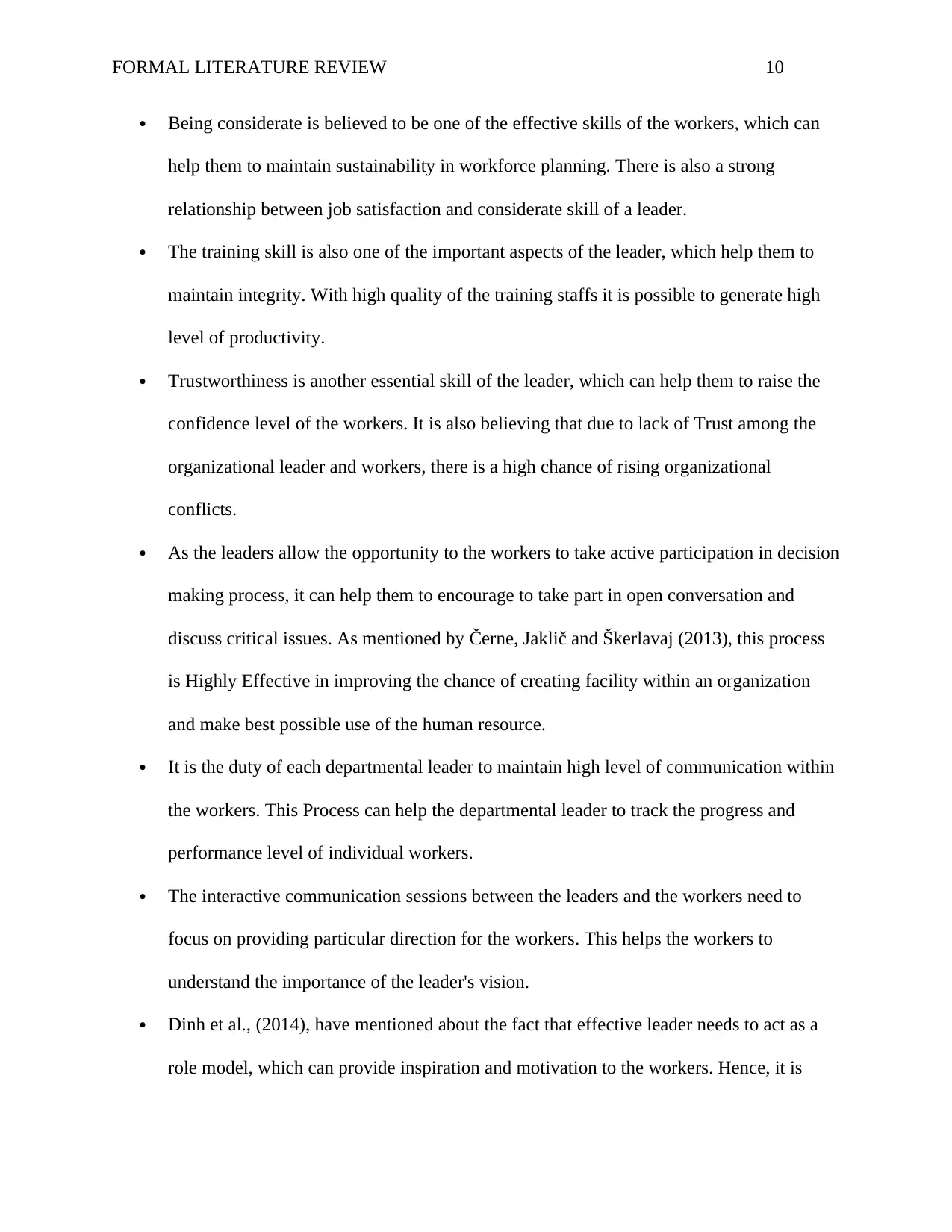
FORMAL LITERATURE REVIEW 10
Being considerate is believed to be one of the effective skills of the workers, which can
help them to maintain sustainability in workforce planning. There is also a strong
relationship between job satisfaction and considerate skill of a leader.
The training skill is also one of the important aspects of the leader, which help them to
maintain integrity. With high quality of the training staffs it is possible to generate high
level of productivity.
Trustworthiness is another essential skill of the leader, which can help them to raise the
confidence level of the workers. It is also believing that due to lack of Trust among the
organizational leader and workers, there is a high chance of rising organizational
conflicts.
As the leaders allow the opportunity to the workers to take active participation in decision
making process, it can help them to encourage to take part in open conversation and
discuss critical issues. As mentioned by Černe, Jaklič and Škerlavaj (2013), this process
is Highly Effective in improving the chance of creating facility within an organization
and make best possible use of the human resource.
It is the duty of each departmental leader to maintain high level of communication within
the workers. This Process can help the departmental leader to track the progress and
performance level of individual workers.
The interactive communication sessions between the leaders and the workers need to
focus on providing particular direction for the workers. This helps the workers to
understand the importance of the leader's vision.
Dinh et al., (2014), have mentioned about the fact that effective leader needs to act as a
role model, which can provide inspiration and motivation to the workers. Hence, it is
Being considerate is believed to be one of the effective skills of the workers, which can
help them to maintain sustainability in workforce planning. There is also a strong
relationship between job satisfaction and considerate skill of a leader.
The training skill is also one of the important aspects of the leader, which help them to
maintain integrity. With high quality of the training staffs it is possible to generate high
level of productivity.
Trustworthiness is another essential skill of the leader, which can help them to raise the
confidence level of the workers. It is also believing that due to lack of Trust among the
organizational leader and workers, there is a high chance of rising organizational
conflicts.
As the leaders allow the opportunity to the workers to take active participation in decision
making process, it can help them to encourage to take part in open conversation and
discuss critical issues. As mentioned by Černe, Jaklič and Škerlavaj (2013), this process
is Highly Effective in improving the chance of creating facility within an organization
and make best possible use of the human resource.
It is the duty of each departmental leader to maintain high level of communication within
the workers. This Process can help the departmental leader to track the progress and
performance level of individual workers.
The interactive communication sessions between the leaders and the workers need to
focus on providing particular direction for the workers. This helps the workers to
understand the importance of the leader's vision.
Dinh et al., (2014), have mentioned about the fact that effective leader needs to act as a
role model, which can provide inspiration and motivation to the workers. Hence, it is
Paraphrase This Document
Need a fresh take? Get an instant paraphrase of this document with our AI Paraphraser
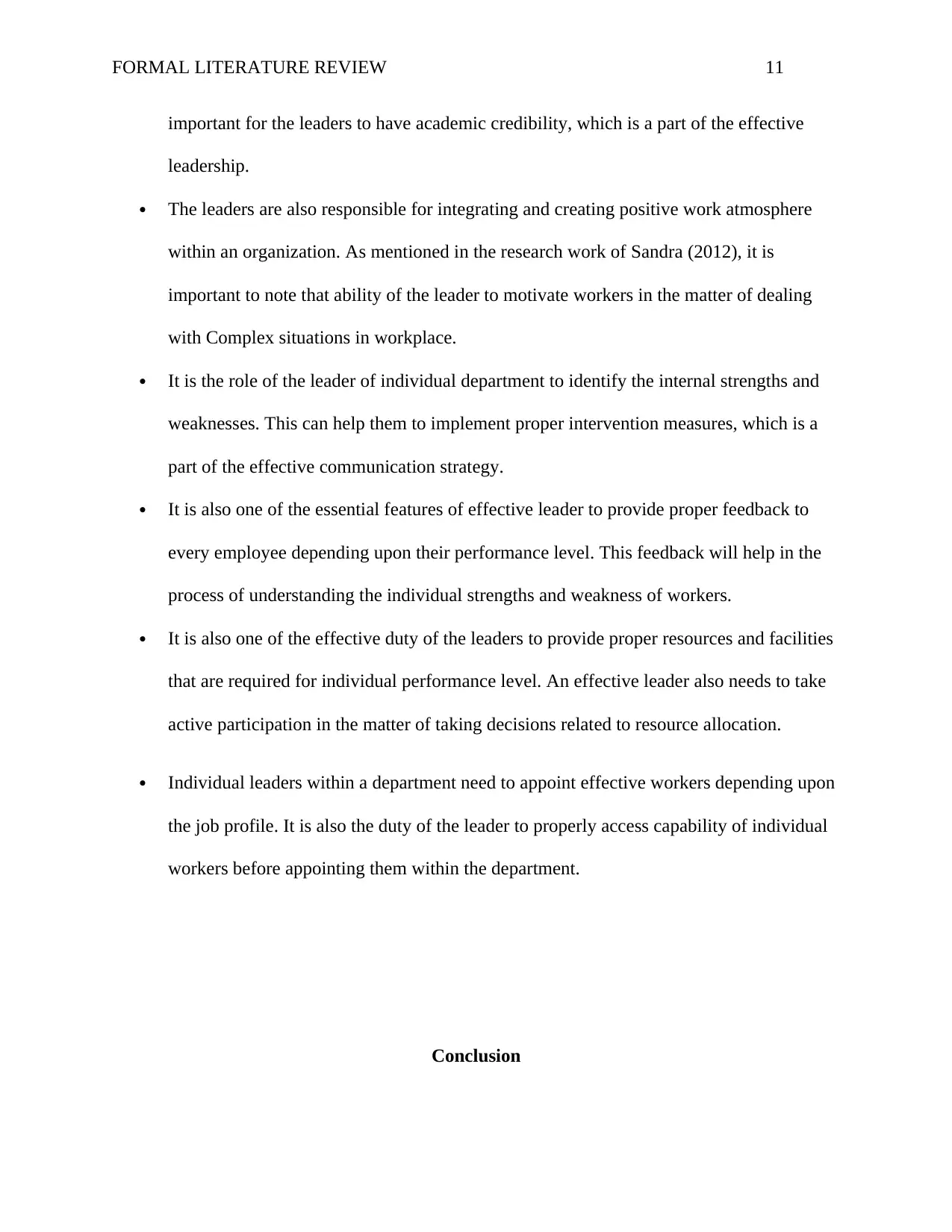
FORMAL LITERATURE REVIEW 11
important for the leaders to have academic credibility, which is a part of the effective
leadership.
The leaders are also responsible for integrating and creating positive work atmosphere
within an organization. As mentioned in the research work of Sandra (2012), it is
important to note that ability of the leader to motivate workers in the matter of dealing
with Complex situations in workplace.
It is the role of the leader of individual department to identify the internal strengths and
weaknesses. This can help them to implement proper intervention measures, which is a
part of the effective communication strategy.
It is also one of the essential features of effective leader to provide proper feedback to
every employee depending upon their performance level. This feedback will help in the
process of understanding the individual strengths and weakness of workers.
It is also one of the effective duty of the leaders to provide proper resources and facilities
that are required for individual performance level. An effective leader also needs to take
active participation in the matter of taking decisions related to resource allocation.
Individual leaders within a department need to appoint effective workers depending upon
the job profile. It is also the duty of the leader to properly access capability of individual
workers before appointing them within the department.
Conclusion
important for the leaders to have academic credibility, which is a part of the effective
leadership.
The leaders are also responsible for integrating and creating positive work atmosphere
within an organization. As mentioned in the research work of Sandra (2012), it is
important to note that ability of the leader to motivate workers in the matter of dealing
with Complex situations in workplace.
It is the role of the leader of individual department to identify the internal strengths and
weaknesses. This can help them to implement proper intervention measures, which is a
part of the effective communication strategy.
It is also one of the essential features of effective leader to provide proper feedback to
every employee depending upon their performance level. This feedback will help in the
process of understanding the individual strengths and weakness of workers.
It is also one of the effective duty of the leaders to provide proper resources and facilities
that are required for individual performance level. An effective leader also needs to take
active participation in the matter of taking decisions related to resource allocation.
Individual leaders within a department need to appoint effective workers depending upon
the job profile. It is also the duty of the leader to properly access capability of individual
workers before appointing them within the department.
Conclusion
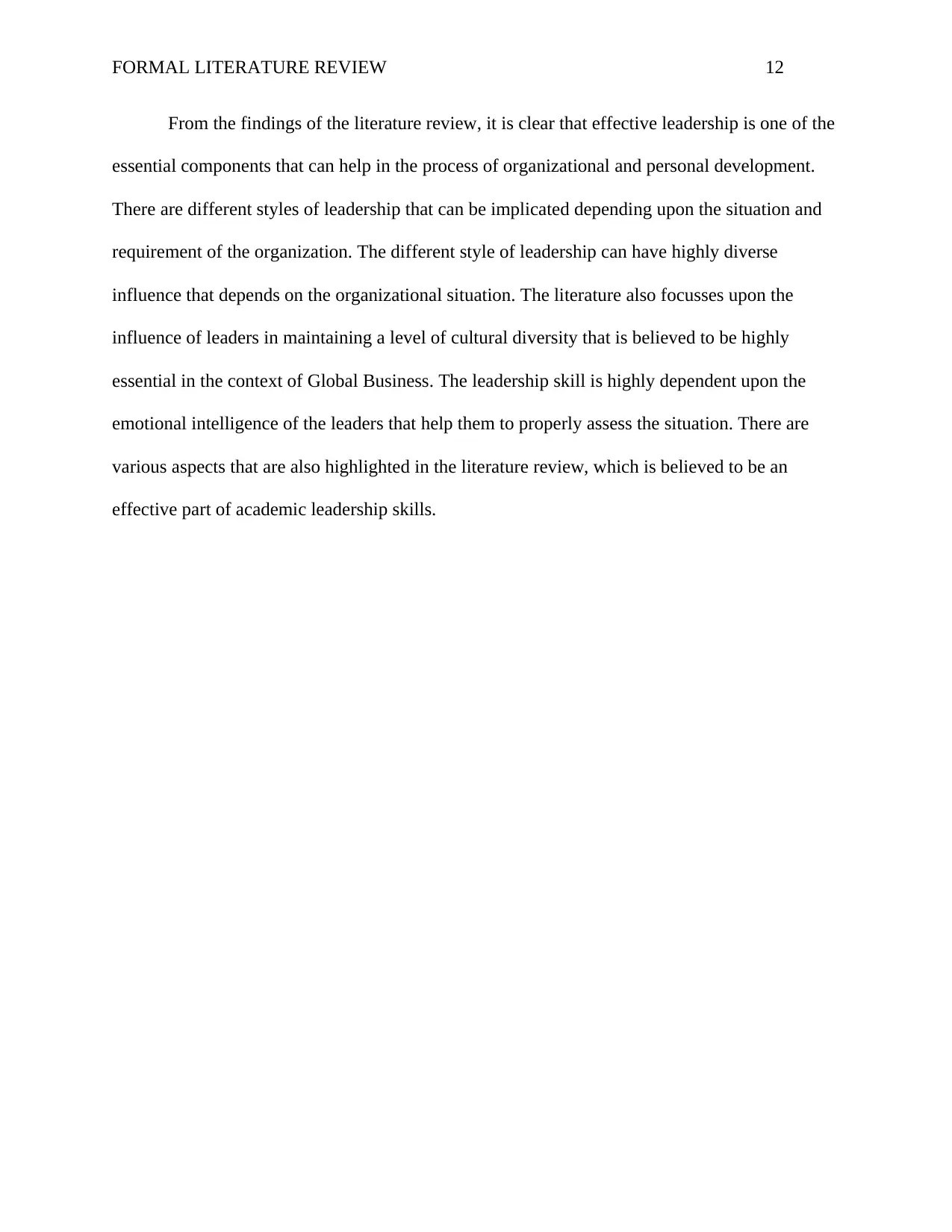
FORMAL LITERATURE REVIEW 12
From the findings of the literature review, it is clear that effective leadership is one of the
essential components that can help in the process of organizational and personal development.
There are different styles of leadership that can be implicated depending upon the situation and
requirement of the organization. The different style of leadership can have highly diverse
influence that depends on the organizational situation. The literature also focusses upon the
influence of leaders in maintaining a level of cultural diversity that is believed to be highly
essential in the context of Global Business. The leadership skill is highly dependent upon the
emotional intelligence of the leaders that help them to properly assess the situation. There are
various aspects that are also highlighted in the literature review, which is believed to be an
effective part of academic leadership skills.
From the findings of the literature review, it is clear that effective leadership is one of the
essential components that can help in the process of organizational and personal development.
There are different styles of leadership that can be implicated depending upon the situation and
requirement of the organization. The different style of leadership can have highly diverse
influence that depends on the organizational situation. The literature also focusses upon the
influence of leaders in maintaining a level of cultural diversity that is believed to be highly
essential in the context of Global Business. The leadership skill is highly dependent upon the
emotional intelligence of the leaders that help them to properly assess the situation. There are
various aspects that are also highlighted in the literature review, which is believed to be an
effective part of academic leadership skills.
⊘ This is a preview!⊘
Do you want full access?
Subscribe today to unlock all pages.

Trusted by 1+ million students worldwide
1 out of 14
Related Documents
Your All-in-One AI-Powered Toolkit for Academic Success.
+13062052269
info@desklib.com
Available 24*7 on WhatsApp / Email
![[object Object]](/_next/static/media/star-bottom.7253800d.svg)
Unlock your academic potential
Copyright © 2020–2026 A2Z Services. All Rights Reserved. Developed and managed by ZUCOL.




